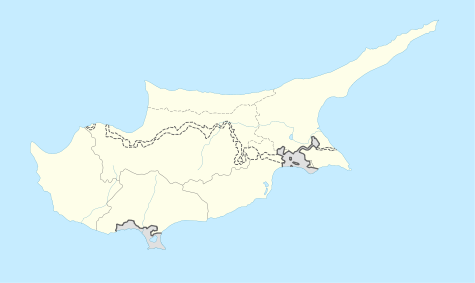Xylofagou
| Xylofagou | |
|---|---|
 Xylofagou Location in Cyprus | |
| Coordinates: 34°58′30″N 33°51′6″E / 34.97500°N 33.85167°ECoordinates: 34°58′30″N 33°51′6″E / 34.97500°N 33.85167°E | |
| Country |
|
| District | Larnaca District |
| Population (2011)[1] | |
| • Total | 6,231 |
| Time zone | EET (UTC+2) |
| • Summer (DST) | EEST (UTC+3) |
Xylofagou (Greek: Ξυλοφάγου [locally [ksiloˈfau]]) is a sprawling Greek-Cypriot village situated close to the A3 Motorway between Dhekelia (Larnaca) and Paralimni / Agia Napa. It lies on the northern flank of a hill,[2]on the edge of an area of a group of several similar villages known as the Kokkinochoria (red earth area), known for growing vegetables, especially potatoes.
Etymology
Xylo is Hellenic meaning 'wood' and a fagou is an extremely popular barbecue-style spit roast used on holidays and high-days for cooking Souvlakia - a special Greek dish - amongst others. Most of the village lies in Larnaca District.
Landmarks
The village is thriving and growing exponentially due to a large amount of building projects taking place within and on the outskirts of the village and there is little to suggest that the local council is tempering this development in any way, town planning seemingly left to the vagaries of market forces. Nonetheless both private and business property is at a premium and does not remain empty for long.
Near Xylofagou is the Cave of the 40 Martyrs, where Christian soldiers sacrificed their lives in the 16th century to evade capture by the Ottomans.[3]
References
- ↑ "C1. POPULATION ENUMERATED BY SEX, AGE, DISTRICT, MUNICIPALITY/COMMUNITY AND QUARTER (1.10.2011)", Population - Place of Residence, 2011, Statistical Service of the Republic of Cyprus, 2014-04-17, retrieved 2014-04-20
- ↑ Bekker-Nielsen, Tonnes (2004). The Roads of Ancient Cyprus. Museum Tusculanum Press. p. 189. ISBN 978-87-7289-956-5. Retrieved 16 March 2012.
- ↑ Bryant, Sue (27 January 2009). Frommer's Cyprus With Your Family: From the Best Family Beaches to Mountain Villages. John Wiley & Sons. p. 182. ISBN 978-0-470-72318-0. Retrieved 16 March 2012.
